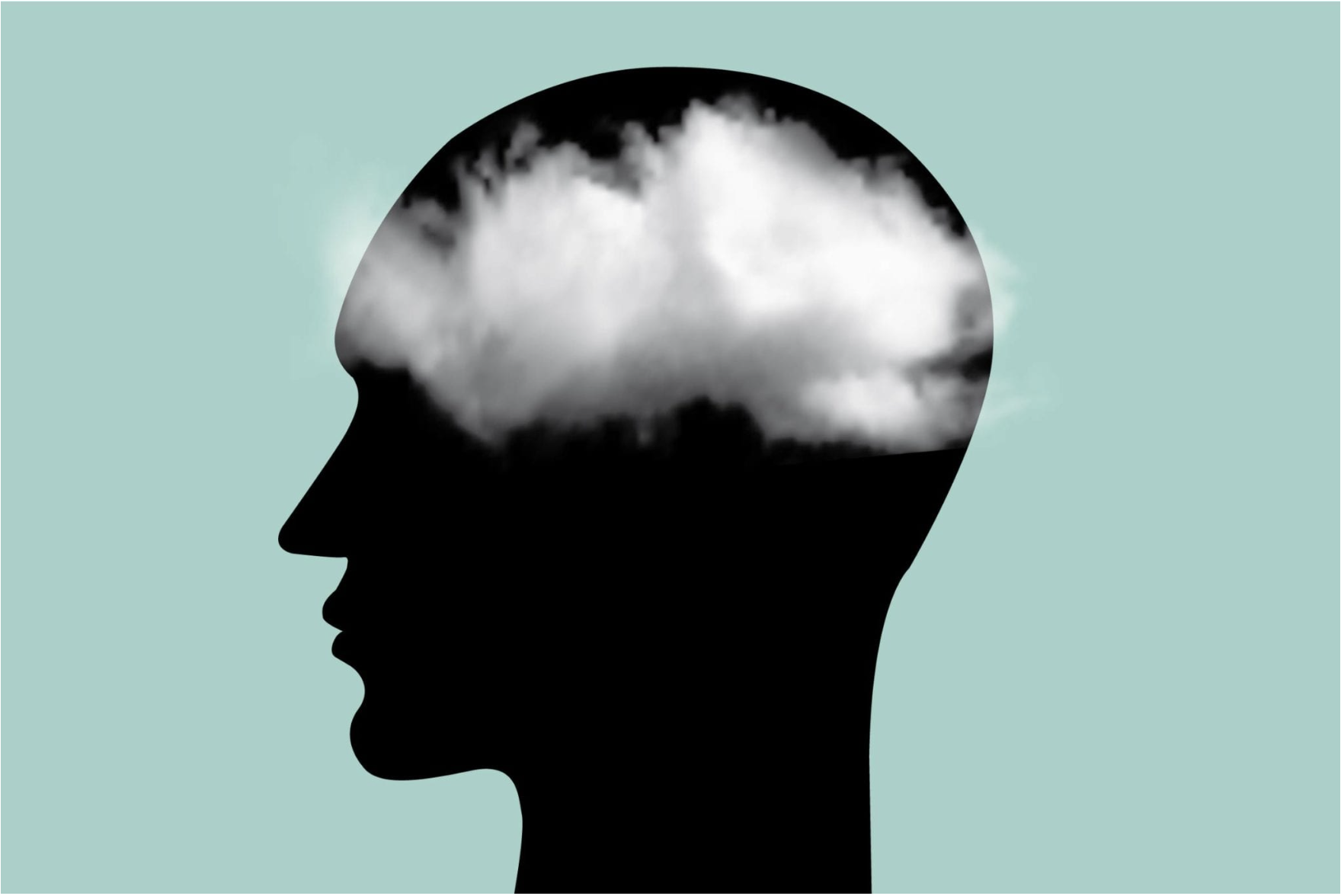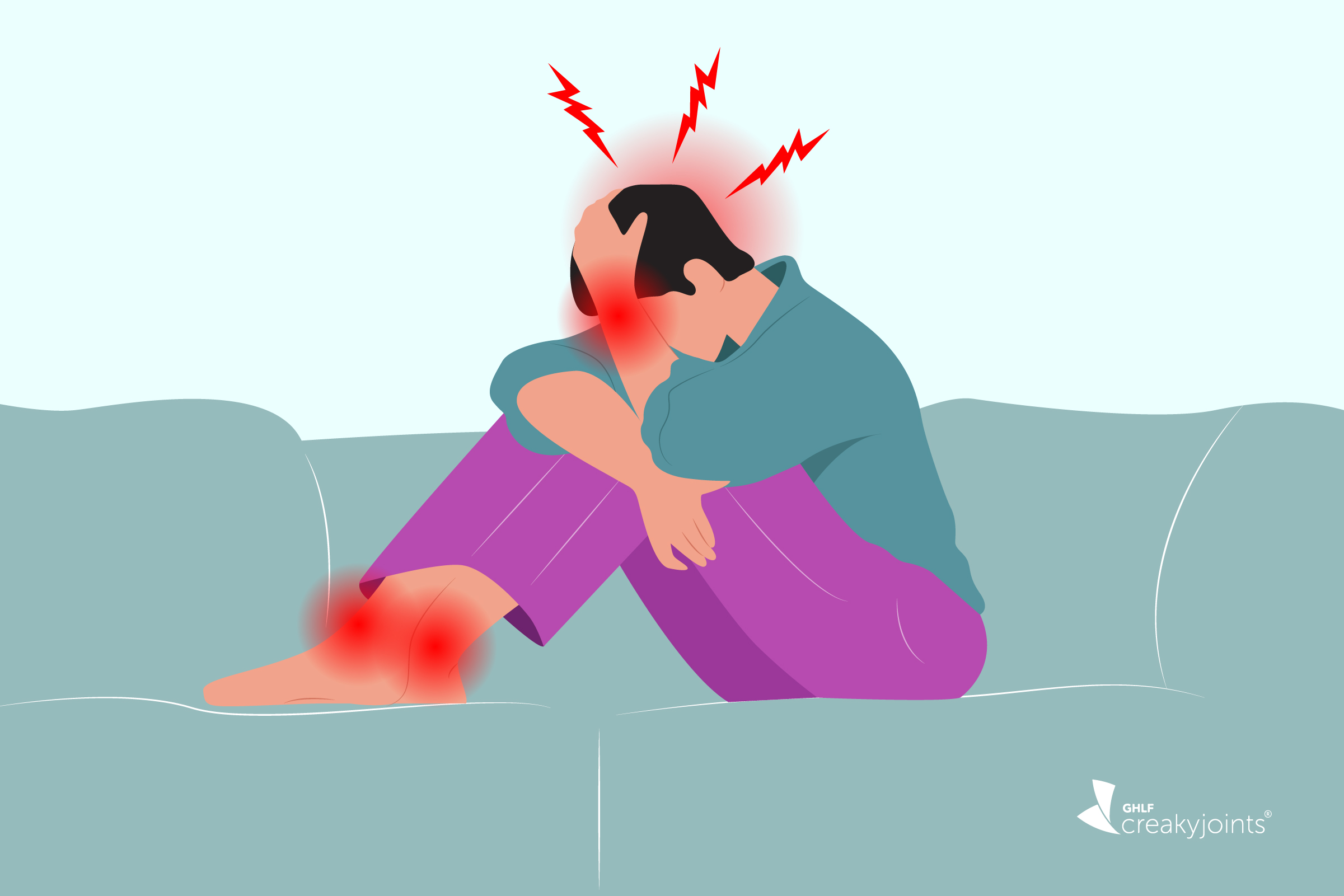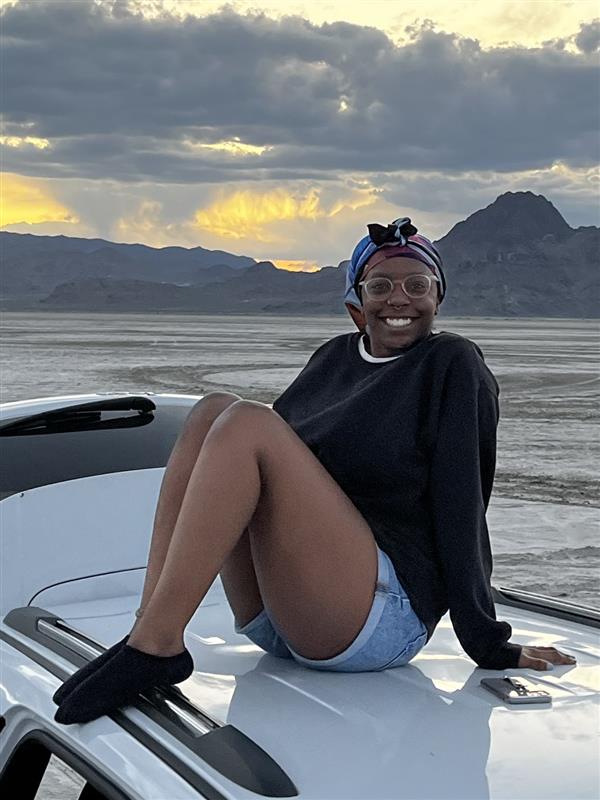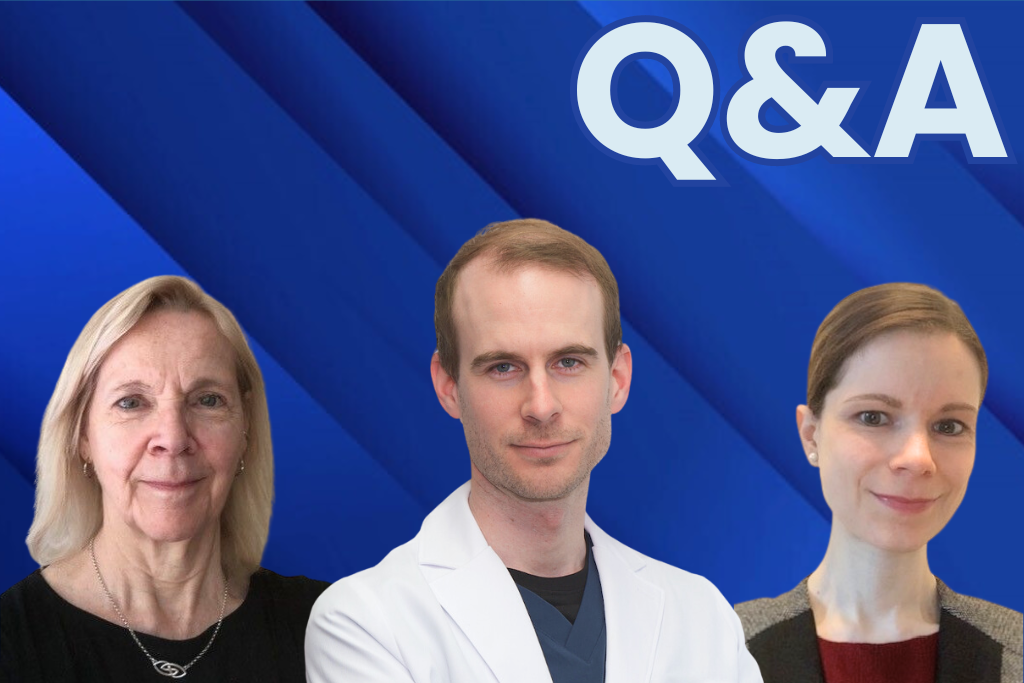Accessing the right asthma treatment isn't always easy. Understand common treatment barriers and get tips to enhance your asthma care.
Supriya’s Journey with Alopecia Areata: From Losing Her Identity to Supporting Others
Supriya’s Journey with Alopecia Areata: From Losing Her Identity to Supporting Others
“I watched this identity that I had of myself for 32 years just disappear before my eyes, and it was just so jarring to look in the mirror and see the stranger looking back at me.”
August 28, 2023
Shelley Fritz
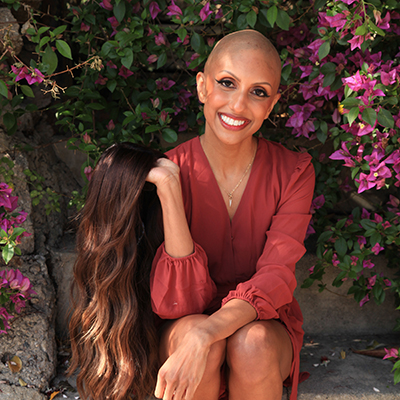
This story was told to CreakyJoints by Supriya Surender, age 40, who lives with alopecia areata in Denver, Colorado. Supriya created the platform Baldie Boo to connect with the community and support others. She fosters cats and enjoys reality television, doing puzzles, and reading books.
I have alopecia areata which is a disease where the immune system attacks the hair follicles, causing hair loss. I had all of my hair until I was 32 years old in 2015.
A Day of Shopping Led to the Dermatologist
My initial diagnosis was in 2013. I was in a Target dressing room that had mirrors in every direction. I had my hair up in a ponytail that day, and while I was looking in the mirror, I noticed on the back of my head, there was a small spot. I thought that was weird and I was touching and felt a bald spot. I had a doctor’s appointment not too long after that, so I brought it up casually, not thinking much of it. They thought it could be alopecia areata, so they sent me to a dermatologist.
There is a dermatologist here in Denver who specializes in alopecia areata and knows this disease like the back of his hand. At that point it was very localized to the back of my head, so we did steroid injections. It caused the autoimmune reaction to calm down and my hair grew back and I thought great.
Feeling the Darkness and Losing My Identity
One morning that May, I was just getting ready for work and, at that time, I was a really big fan of teasing combs. I loved big hair. I noticed a pile of hair in my hands, but I’ve always shed a lot, I’m an Indian woman. I’ve always had thick hair and so shedding was never anything alarming, but this amount seemed more than normal and it didn’t stop. So anytime I ran my hands through my hair, it would just come out, come out, come out. In three months, I was bald. I lost all of my hair. It just fell out by the handful until it was gone.
I was devastated. I was probably in the darkest place of my life, you know, 32, single, and now bald. Nobody prepares you to be a bald woman.
Becoming a Stranger to Myself
The following year, I lost my eyebrows, which was almost harder than the hair on my head. You don’t realize how much your eyebrows make your face until they’re gone, and so when my eyebrows fell out and I didn’t have hair, I was a complete stranger to myself.
It was just so hard for me because I like to control my life. If something’s wrong, I like to figure out the steps I need to take to fix it. It’s not that simple with autoimmune diseases. There was nothing I could do; it was completely out of my control.
I couldn’t imagine being happy in this version of myself, and so I would cry. I cried every day on my way to work and on the way home, the second I walked in the door. I always say I was in a cry sandwich because that’s just all I did.
Every day I was just kind of going to my little hole. I woke up every morning hoping that the hair had stopped falling out, and then it would be falling out. It was just a dark time for me. A lot of times I questioned whether or not I still wanted to exist on this earth.
I had a lot of these very dark thoughts. I watched this identity that I had of myself for 32 years just disappear before my eyes, and it was just so jarring to look in the mirror and see the stranger looking back at me.
Feeling Alone
I think I wanted to be a recluse. I felt so uncomfortable and like people were going to know I was wearing a wig. At that time my circle of friends was very tied to CrossFit, and I was a cross fitter, too. I just hated going to the gym without my wig because it was too uncomfortable to wear it there. I felt the sweat dripping all over my face with no hair to catch it, no eyebrows to catch it, and I just didn’t want to be reminded of it all the time, so I ended up quitting the gym and just kept to myself for a while.
I wasn’t good at telling my friends just how much pain I was in emotionally so I just really kind of squirreled myself away. I was single at that time and I thought, well, I guess I’m just never going to meet anybody. My thought was who’s going to want to date a bald woman? I just had that mindset. I thought, well, I guess I’m just going to be alone forever. That was my mentality at first.
A Medical Emergency Led to Making Peace
In 2017, that November, I had a massive pulmonary embolism. I remember shortly after that a doctor telling me if you hadn’t gotten to the hospital, you probably would have died because it was branching into both sides of my lungs. It was a big one.
And you know the gravity of that didn’t hit me when she said it at first. Quite honestly, when it happened, I just had this moment of one more thing I have to deal with and being so angry at the world and at my body for doing this to me.
I’m Tired of Letting Alopecia Areata Win
I turned 35 and I had this awakening. Thirty-five felt like such a scary age to me up until that point, but then I realized, not a lot of people get birthdays. It’s a blessing to be able to celebrate another year of life. And my pulmonary embolism could have been the thing that stopped me from getting to 35. I just realized I’m tired of letting alopecia areata win. I’m tired of just living in misery when I could start to chase happiness instead.
Then I had a blast that whole year. It was filled with boozy brunches with girlfriends and just enjoying my life and really trying to live in the happiest version of myself as I am like this. I still have good days and bad days, but overall, it’s been on the up and up ever since.
Finding Inspiration and Happiness Again
I was feeling stressed out. There’s just so much unrest in the world and so much negativity and volatility, and I didn’t feel like I was doing anything to add positivity into the atmosphere. I realized in that moment that, with my alopecia areata, I had struggled for a long time.
In 2018, I really started to make peace with it and started to feel happy again, and I realized I had a story to tell and that with my story, there was a chance one person could read that and see that there’s hope with this disease — because it can feel so hopeless at times.
I decided to start Baldie Boo. I spent that next year really intensely blogging every week. It was very therapeutic for me to process all of my emotions and then through that blog and my Instagram, I really connected with the alopecia areata community.
I found so many people who related to my story and so many people who also inspired me on my journey because even though I had found happiness at that point, I’m still very secretive about my alopecia areata. I was confident talking about it online, but it was still scary for me to go out in public without a wig. I found so much inspiration for myself through the community.
A Nightmare Experience at the Hair Salon
The first salon I went to was a wig shop, when I was down to my last few strands of hair. Before that, I had a topper. It’s like a wig, but it just clips into the hair that you have.
At this point, I had very little hair left, so I was looking for a full wig. I remember going in there and they plopped this big wig on my head. When she took the topper off my head, she did it so aggressively that it pulled some hairs out with it. I had such little hair left; it was so upsetting to me.
They only cared about making money and not helping the client. It wasn’t the right color and I didn’t like the way it looked. She refused to accept that and said “No, this color looks really good. I like this color.” It was the only wig they had in stock; they didn’t have the color that I liked.
When I told them I wasn’t ready to purchase this wig yet, because wigs are very expensive, her demeanor immediately changed as if she was mad at me for not wanting to buy it from them. That prompted me to find a new salon.
I went to a local wig shop in Denver and she was wonderful. She was actually a breast cancer survivor, and her salon caters to hair loss clients. It was a very warm and comforting experience to talk to her. She shaved off those last few strands of hair I had left before I got my wig, so I cried in that salon. It was definitely comforting talking to her about that prior to getting my wig.
A Message for Hair Stylists about Support
People with alopecia areata aren’t necessarily looking for you to fix their problem, but they want to know you are supportive. They may have questions for you. You are in the hair industry, so it’s common for someone in the early stages to ask their hair stylist about it because you see hair and scalps more than anybody out there.
Just be compassionate and know it’s a very scary experience to go through. The more compassion and acceptance that you can show toward them, the easier the experience becomes.
“At Least” Statements Are Not Helpful
I think one of the biggest things that people in the hair loss community hear when talking about hair losses is well, at least it’s just hair, at least you’re not dying. At least it’s not cancer. At least it’s not this.
I have a theory. Well, not a theory, but a state opinion that under no circumstances when you’re going through something very life-altering does an “at least” statement ever help. It never helps under any circumstances.
Instead of saying “at least,” you could pivot and say, “That must be so hard. You know, I don’t have hair loss, so I don’t understand what your emotions exactly are, but I’m here for you. I’m here to support you. I know that it must be very difficult situation for you. How can I help you?”
You should be able to talk and have outlets without your emotions being downplayed.
We’re not looking for someone to rationalize or downplay our emotional pain. It completely invalidates the emotional pain and makes people feel like they can’t talk about it. Then people just hold everything inside, and that’s not a great way to live.
Sometimes people would say things like “Oh, you’re so lucky you have a nicely shaped head. If I was bald, my head would be so knobby.” I’ve heard that so many times. I remember feeling like that’s great that you think I have a nicely shaped head, but I don’t want to see my head.
How do I respond to a comment like that? Nothing about alopecia areata ever felt lucky to me. I don’t feel lucky, I feel awful. That now makes me feel guilty that I have all of these terrible emotions about it.
What to Say to Someone Going Through Something Hard
It’s important to provide simple support like I love you. You don’t need to solve anybody’s problems. You can say:
- I am here for you.
- I care about you.
- I may not be going through it too, but I will go through it by your side with you.
- What can I do to help you?
- I’ve got your back.
- You’re going through a hard time right now.
- I just want to make sure you’re okay. Are you good?
- Do we need to go eat some French fries? What do you need?
Then check in on your people — diseases or not — just be there for people.
Not Just a Cosmetic Disease
Medically speaking, alopecia areata is often considered just a cosmetic disease because it impacts your physical appearance; it’s not impacting your organs. And by saying it’s just a cosmetic disease, it completely negates the emotional side that comes along with it because it’s so much more than the physical impact of it.
There’s so much emotional turmoil that happens when your physical identity changes so drastically and so out of your control — so it’s just important to know that it’s far more than a cosmetic disease.
It’s all-encompassing. It affects your day-to-day, your relationships, your self-worth. It’s important to recognize all of that and understand that when someone is going through this, it’s impacting every facet of their life — and they’re trying to find their new normal. Anything that you can do to help be that emotional support always helps.
Join GHLF’s HEROES Program
GHLF invites you to make a difference in your community with our FREE and unique program called HEROES (Health Education + Reliable Outreach + Empathetic Support). HEROES is a FREE education and outreach initiative that equips beauty professionals to better support clients living with scalp and other skin conditions and offers people living with skin and scalp conditions helpful resources and information on getting a proper diagnosis, managing symptoms, and becoming an empowered patient. To learn more, visit GHLF.org/HEROES today.
SUBSCRIBE TO GHLF
RELATED POST AND PAGES
_
Was this article helpful?
YesNo

